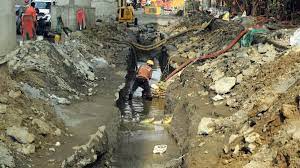
A burst water pipeline in Mumbai triggered a 50-hour-long repair operation by the Brihanmumbai Municipal Corporation (BMC), leading to low water pressure and intermittent cuts across several areas. The incident, caused during drilling work for a metro project, prompted BMC’s commitment to recover repair costs from the responsible contractor, leaving citizens grappling with water scarcity and unmet demands for essentials.
The rupture occurred on November 30, affecting the 1800 mm diameter pipeline in Andheri East. Initially pledging a 24-hour resolution by December 2, BMC’s repair endeavor took longer than anticipated, with a team of 100 civic employees laboring on the task until Monday afternoon.
The damages arose during drilling activities linked to the metro project, prompting BMC’s intention to issue a notice to the contractor responsible. BMC seeks not only to recover repair expenses but also to levy penalties for the water wastage incurred during the incident.
Residents residing in several areas, primarily within the K West ward encompassing Jogeshwari West, Andheri West, and Vile Parle West, alongside regions like Bandra, Khar, and Ghatkopar, bore the brunt of this water pipeline disruption. Citizens grappled with low water pressure, intermittent supply, and an unexpected shortage of packaged drinking water and water tanker services during the repair period.
The scarcity led to inflated prices of 20-liter packaged water cans, causing distress among the populace. Dhaval Shah of the Lokhandwala Oshiwara Citizen’s Association highlighted the soaring black market prices, reaching nearly double the standard rates due to heightened demand and scarcity.
BMC officials attributed the prolonged repair time to technical complexities and the risk of loose soil collapse resulting from continuous leakage. Purushottam Malwade, BMC’s hydraulic engineer, cited the challenge in plugging the pipeline from the inside due to the ongoing flow, necessitating exterior sealing.
The impact was substantial, affecting supply to multiple reservoirs and requiring extensive water tanker services to mitigate the crisis. Rajesh Thakur, secretary of Mumbai’s water tanker association, confirmed the extensive supply of tankers in the affected areas to alleviate the dire water situation.
Amid the turmoil, Deepa Agrawal, a housing society committee member in Oshiwara, expressed the plight faced by residents, emphasizing the lack of prior warning and the scarcity of essential water supplies, particularly impacting senior citizens.
As the repairs concluded and supply gradually resumed after six hours of charging the reservoirs, citizens in the affected areas continue to grapple with the aftermath of the prolonged water crisis, highlighting the need for better infrastructure management to avert such disruptions in the future.
Sources By Agencies


